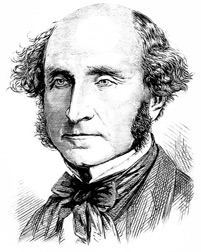Greatest happiness to the greatest number
 The utilitarian
standard ... is not the agent’s own greatest happiness, but the greatest
amount of happiness altogether, and if it may possibly be doubted
whether a noble character is always the happier for its nobleness, there
can be no doubt that it makes other people happier, and that the world
in general is immensely a gainer by it. Utilitarianism, therefore, could
only attain its end by the general cultivation of nobleness of
character. The utilitarian
standard ... is not the agent’s own greatest happiness, but the greatest
amount of happiness altogether, and if it may possibly be doubted
whether a noble character is always the happier for its nobleness, there
can be no doubt that it makes other people happier, and that the world
in general is immensely a gainer by it. Utilitarianism, therefore, could
only attain its end by the general cultivation of nobleness of
character.
-
John Stuart Mill
In almost every society people have two types of desires. Some people
want change and progress. Most young people fall into this category.
Undergraduates and young people clamour for rapid progress and change in
education and development. They are sometimes an impatient lot. On the
other hand, most elderly people and some youngsters want security and
order in society. They are not so much worried about development. They
want to live in a secure and orderly society. The government has to do
justice to these two segments to remain in power.
With the population explosion, contemporary society has become
extremely complex. In most developing countries, governments have to
settle competing interests, conflicting views and dispense justice with
limited resources. It so happens that privileged classes desire order
and discipline in society. The not-so-privileged classes want rapid
solutions to their day-to-day problems.
Welfare
The government in any developing country builds highways and housing
complexes for the welfare of the people. However, when a highway is
built, some people will have to give up their land and property. Such
appropriation of private land at fair market prices is inevitable. Even
if the owners are not willing to sell their lands, they can be forced to
do so. This is done on the principle that the general welfare of the
people takes precedence over individual rights.
|

John Stuart Mill |
Unknown to some of us, the principle of looking after the general
welfare of the people is based on a firm philosophical foundation.
Accordingly, although we must respect individual rights, the welfare of
the majority takes precedence. This is nothing but utilitarianism
formulated by the celebrated British philosopher Jeremy Bentham. It was
further refined by his student and friend John Stuart Mill.
Modern utilitarianism developed as a response to social conditions
created by the Industrial Revolution that lasted from 1780 to 1835. When
large factories were opened in cities, hordes of workers sought
employment in them. They did not find suitable houses to live in. As a
result, large slums began to appear in the cities. This led to another
problem. Unchecked population outgrew the food supply. To solve this
problem, Jeremy Bentham had a philosophical solution:
Establish the conditions most conducive to promoting the greatest
happiness for the greatest number of people.
Refined pleasures
John Stuart Mill (1806-1873) championed the cause of utilitarianism
formulated by his guru Jeremy Bentham. Mill refined utilitarianism and
argued that “refined pleasures” are better than “cruder pleasures.” His
goal was to make as many people as happy a possible. However, other
contemporary moral philosophers have uncovered troubling problems with
utilitarianism. For instance, the emphasis on the greatest happiness of
the greatest number can result in immoral actions. Modern commentators
have complained that Mill’s ethical principle is too demanding.
Today utilitarianism is an integral part of moral philosophy.
However, it has never been without severe critics. Despite the reference
to “the greatest number” in Bentham’s phrase, the right choice in any
situation is the one which can produce the greatest happiness to the
greatest number of people. The principle can be applied to politics and
all other spheres of life. In that respect, the theory of utilitarianism
still has a universal appeal.
Happiness
While utilitarianism remains an attractive theory in principle, there
are many difficulties which arise when we try to put it into practice.
For instance, it is extremely difficult to measure happiness. When we
cannot do so, we find it difficult to compare the happiness of different
people. Jeremy Bentham said that such comparisons could be made. For
him, happiness was simply a blissful mental state.
Mill, however, suggested a distinction between higher and lower
pleasures. the higher pleasures were mainly intellectual. The lower
pleasures were physical. According to modern thinkers, this sounds
rather elitist. This is because that amount of happiness cannot be
calculated.
A further objection to utilitarianism is that it can be used to
justify many actions which are deemed to be immoral. For a utilitarian,
hanging a condemned criminal is the morally right thing to do. But such
a course of action is repugnant to our sense of justice.
|

